- Home
- David Levithan
Every You, Every Me Page 2
Every You, Every Me Read online
Page 2
“Have you heard from her?”
He shook his head.
“It’s a good photo,” he said. Then we went inside and split off into our own trajectories.
There were so many voices, so many people around me. I stood there on the side of the hallway and watched everyone pass—some traveling together, some meeting up, most entirely unaware of anything besides where they were going, each particle knowing its own destination without ever knowing the exact path. Is this what you meant when you said you were splitting? Every step, even the smallest movement, marking a different line. I started plotting out the variations of my own route—not just the ways I could go, but all the people I might step a little bit aside for, or slow down for, or speed up to see. I was starting to get lost in my own infinities, so I refocused on the faces, on the people I knew and the people I recognized and the people who seemed familiar and the people who were strangers even though we had this school in common. There were two thousand of us in this building, and one of them, I thought, was responsible for the photograph in my pocket. One of the two thousand was responsible for the envelopes and the mystery and my thoughts at that exact moment. One of them had done it.
Unless it was the girl who wasn’t here.
2C
I’m lying, aren’t I?
I never wanted you to take my picture. You did, but I never really wanted it.
We were at the pool. It had to be summer. I didn’t want to take my shirt off. I never took my shirt off. But you said I was being ridiculous. That was your word. Ridiculous. Mostly friendly, but a little teasing. You asked me what I was ashamed of. Had I carved Molly Hughes’s name on my chest? Were there unicorn tattoos I hadn’t told you about? Was I wearing a man girdle? I wasn’t really laughing, but I wasn’t not laughing. You tugged at my shirt. I said fine and took it off. Felt the sun. Felt so pale. And you took out your camera. Said you had to capture this for posterity.
I felt like I was your accomplishment, when what I really wanted was to be your friend.
“You see,” you said, “you have nothing to hide.”
I didn’t want you to see me with my shirt off. It was weird.
I never saw the picture. You might have deleted it.
I mean, I doubt you still have it.
Did the accomplishment mean anything in the end?
3
I went back to the spot after school, but there wasn’t any new photo there. Same thing the next morning. Even though I knew two points didn’t make a pattern, I was still disappointed to find nothing there. It couldn’t just end. Not now.
3A
You are leaving me messages, but I haven’t gotten the message yet.
3B
I took out my notebook. I ripped out a page. I wrote WHO ARE YOU? across the top and left the rest of it blank. I moved the second photograph into the first photograph’s envelope, then stuck the note in the empty one. I left it there before meeting up with Jack on the patio.
When I ran back between second and third periods, the envelope was gone.
But there wasn’t anything left in its place.
3C
I checked during lunch. I checked after school.
The spot was empty. Empty but not void. Void is when there is absolutely nothing there and the nothing is natural, a complete vacuum. But empty—with empty, you are aware of what’s supposed to be there. Empty means something is missing.
Once again, a grayness was settling in. My mood. The light around me was changing its properties. I tried to catch it dimming, but it was imperceptible.
I started walking home. The normal route.
I was trying to connect the words in my head when I saw it. Nailed to a telephone pole. Another envelope.
Not taped there. Not tacked up. Nailed. At my eye level. Precisely.
I wondered how long it had been there. I wondered why nobody else had seen it. I wondered if I’d passed by it on my way to school, missing it because I didn’t look back.
But most of all I wondered what was inside.
For some reason, I was expecting an answer to the question I’d left behind: Who are you? I wanted the photographer to leave me a self-portrait.
Instead I got more trees. This time with a wall, curving into an arch at its top.
3D
3E
I figured I had to go back into the woods, directly from this spot. I wouldn’t find you there. I knew I wouldn’t find you there. It couldn’t be a coincidence that the photographer had chosen this pole. Coincidence. Things coinciding. The tree line was to my right. I’d never ventured this way before had I? but I imagined it would all be the same when I got inside. And by imagined I mean I really did imagine it—I sent a mental search party walking there even before I’d moved a step, picturing it like it existed. Then, from that single section of wall, that single set of stones, I built an entire castle. I imagined a fortress waiting in the middle of the forest—not with a sleeping beauty inside, but haunted by a sleeping beauty’s ghost. The body would have decayed to dust, showing that all beauty is temporary, except perhaps in stories. My mind was getting away from reality again, and I reluctantly drew it back in. There is no getting away from reality. Well, only one way. I knew there were no castles in this small patch of suburban thicket. You, Jack, and I would have found them by now. We would have known.
We had been kids here once.
“Ariel!” I called out now like I’d called out then. When you’d been hiding. When I’d seeked.
Remember?
You never answered. Not with words. Sometimes you’d simply look over from wherever you were, and that small movement would help me find you. Other times you’d wait. And if it grew dark and I hadn’t found you, I knew to go to your backyard steps. If you weren’t already waiting for me there, I waited for you. You always returned. Until you and Jack started up. For a time, I still waited for you, even though I knew you were somewhere together, maybe inside. Then I stopped waiting.
It was too dim now. I was unfamiliar with this nonpath. I walked through the woods, lost, making my own wrongheaded trail. Then I got to a spot. Not the spot I was looking for, but another spot—a spot I remembered. You and I had been here, on this kind of a day, with the clouds venturing too close to the ground, too deep into my thoughts. We came into the woods because nobody else did. When you weren’t with Jack, you were mine again. Last year. It must have been late last year. We’d escaped into the trees to hold hands and talk. This wasn’t unusual for us to do, I loved it so much and I wouldn’t have remembered this time as different from any of the others if it hadn’t been for what you’d said.
I don’t want to remember this. But I have no more control over my memories than I do over the past.
“If I ever ask you to get me a gun,” you said, “could you?”
At first I’d thought it was a joke. I asked you what kind of gun.
Remember?
“The shooting kind,” you answered. “A real gun.”
That’s when I knew it wasn’t a game or a joke. It was a test. A trap.
“What are you talking about?” I said.
And you repeated, “If I ever ask you to get me a gun, could you?”
“A gun?”
“Yes, a gun.”
Nobody in my house owned a gun. Nobody in my life.
I told you this.
“But would you go out and find one for me? If I told you I really needed one.”
I’d wanted to say You’re crazy, but already those were dangerous words.
You were facing me, but your expression was all zeros. Your hand was resting on the bark of a tree, and that’s what my eye fixed on. I wondered why we call a tree’s skin bark instead of just skin. I wondered if it was because ours is so weak in comparison.
“Evan,” you said, bringing me back.
“I couldn’t get you a gun,” I told you.
“But if you could, would you?”
“Why are you asking me this?”
&
nbsp; I thought I could contain it. I thought I could prevent it.
You moved your hand from the tree. Walked over to me and nestled in. I thought that was it. I thought we were moving on.
But then you said it, in a matter-of-fact voice.
“If I ever ask you to get me a gun, don’t. Whatever I say, don’t.” Looking right into my eyes. “Listen to me, Evan. If I ever ask for that, go get help. If I ever ask for that, you’re going to have to save me.”
Plus/minus
Positive/negative
1/0
I can/I can’t
I will/I won’t
You are/you aren’t
I said/I thought
I said “I will”/I thought I can’t
I thought I can/I said “You won’t”
There’s no way to release yourself from a memory. It ends when it wants to end, whether it’s in a flash or long after you’ve begged it to stop. What was the next line? What did I say to you then? I probably changed the subject, and the new subject wasn’t worth remembering. So I was back in the present, back in the woods, photograph in hand. I heard cars in the distance. I let myself be hit by branches. I did not walk aimlessly—I had an aim—but I walked mindlessly. I heard the tops of the trees being shaken by wind. I looked for walls. I stopped calling your name.
It was unfair, I thought—the photograph had made the leaves white. I was looking for things that weren’t as they were.
Then I realized I could be walking on top of what I was looking for.
And I thought, Of course.
3F
There was a place where the woods dropped. There was a path. And a bridge. A small bridge. A small stone bridge.
I ran as if someone was waiting for me. As if I was late.
“Listen to me, Evan. If I ever ask for that, go get help. If I ever ask for that, you’re going to have to save me.”
I tried I tried I tried I
It was about ten minutes farther in. This strange stone bridge, patching the gap between two cliffs. A memento of some earlier settlers, who might have had uses for the forest that were obscure to us now.
It was your mind. What could I do?
Focus, I thought. Focus.
I skidded down the dirt edge of one of the cliffs. I felt like I was bruising myself, but I didn’t mind. I saw the arch but couldn’t see if anything was in it. Anyone. I wanted you to be waiting with your camera. I wanted to be blinded by a flash, hear a laugh behind it.
Nothing stirred as I approached. The bridge had been out of use so long that the trees and the shrubs had begun to grow underneath it. Abandoned. I stepped through the undergrowth and looked through to the other side.
“Hello?” I called.
I had gotten so used to being alone, but never entirely used to it. Never used to it enough to stop wanting the alternative.
I jabbed my shoulder against the wall, made another bruise. The stones curved right over my head. They were cold, colder than the air.
I started to find patterns in the way the stones were stacked, and that’s when I saw it. Shoved into the bridge like a message that had been left for the rocks.
The next envelope.
As I reached up, I flashed into a fit of frequencies—all of them playing at once. Your voice, saying you would never forgive me. The first envelope sitting on the ground, my hand reaching down for it. My mother telling me not to touch things as we walked through a museum. Or maybe it was someone’s house. The curve of the stone next to the crack. And the crack itself—the shape of it, how it grabbed hold of the envelope. Hunger and sounds and my shirt pulling up as I reached, exposing the skin. The bark. I thought about the castle this was supposed to be, and wasn’t. Your prison. Jack’s cigarette. The fire that receded to the tip of his mouth and the smoke that expanded into the air. Two infinities: the one that stretches to the beginning but never touches—when you halve and halve and halve and halve, infinitely—and then the one that spreads out into the endless, endless future, the endless, endless distance. The set of infinities that is itself infinite. How do we go on? When so much happens to us, how do we go on? I took the envelope in my hand. I was already picturing myself opening it. I was already ahead of myself. But I had to stop that image—I had to stop that prediction—because I had no idea what was going to be inside.
Like every fool before me, I reached.
4
4A
It was your mind. The way you were wired. That was the only thing all the theories had in common. You were manic. You were depressive. You were schizophrenic. You were on drugs. You were on the wrong medication. You needed medication. You heard voices. You’d lost the will to speak. Anxiety. Disorder. Nobody knew for sure, at least nobody who was saying anything. After you left, all that remained were guesses. I would go over everything. Every detail. Every panic. Every sigh. But they never added up to anything but you. I only saw the person. I couldn’t see the wiring. I couldn’t fix the wiring.
I tried I tried I
4B
At first I needed daylight to see it—or any light—because it was too dark to make out anything in the tunnel. I needed the articulation of light—or at least I thought that would be enough. But then when I was outside again, the image still wasn’t clear to me. We were still in the woods, yes. And there was a figure. But who? What? It could be Bigfoot staring at me.
I needed magnification. Because if I kept on staring, the photograph would become the stories I made for it, and I’d have no way to get back to the truth.
“You’re not making this up,” your mother said. “Are you?”
I ran went home and attacked the drawers. I needed a magnifying glass. I had no idea why we would have one, but it seemed like the kind of thing every house would have. Hammer, egg timer, magnifying glass. I was opening drawers I hadn’t opened in years. In my top desk drawer I found stamps that were now devalued, ink pads that had dried up, a rubber zoo of pencil-top erasers shaped like cartoon characters. It was like my childhood had fallen overboard from my life and had washed up here, in secret. But no magnifying glass.
But I still have your sunglasses. You left them at my house. I guess that means they’re mine now. I’d give them back if I could. I keep them on my desk. I can’t bring myself to put them away. They don’t look good on me. I remembered one time I tried and you laughed and said that there wasn’t a pair of sunglasses in the world that didn’t make me in some way look like a douche. You said I had honest eyes, and that I shouldn’t try to hide them.
I checked the kitchen drawer that held all of the things that didn’t belong in any of the other kitchen drawers—the pot holders, the scissors, the glue stick. Nothing. I checked my dad’s desk drawer, with its language of paper clips and binder clips. Nothing. I checked in my mother’s desk drawer—just old business cards and notes and a few photographs of me from when I was younger, much younger, extremely young. Was I always like this?
And then my mind started getting so angry at itself. I know I suck. I know I’m stupid. Stop telling me. I know. Because the answer had been here all along.
I loaded up our computer. Turned on the scanner. Placed the photo on top of the glass operating table. Pressed a few buttons. Turned away from the light.
The scanner translated the photo into pixels. Then it translated the pixels into zeros and ones. Then it translated the zeros and ones into pixels again, which in turn were assembled into an image on the screen.
I clicked zoom.
And again.
And again.
200 percent.
And again.
And again. And again. I kept clicking until the photograph was demolished, until it was no more than a mosaic of gray tiles, adding up to nothing. Nothing. Because wasn’t that how I felt that day? If you zoom close—if you really get close to someone, if you really get close to yourself—then you lose the other person, you lose yourself entirely. You get so close you can’t see anything anymore. Your mind becomes all these abstrac
t fragments. English becomes math.
I zoomed until all that was left was squares. Sixteen. Then six. Then four.
The computer stopped me at four.
These four squares told me the truth. I no longer recognized what part of the photo they came from. They could be leaves. They could be part of my hair. My skin. The antique camera in my hand. The dirt. All I knew was which day they came from. Unmistakably.
Somebody else had been there that day.
Somebody had seen us.
4C
I knew I should have called Jack, should have told him … but I didn’t. Not yet. I was afraid of him thinking that I was crazy, too. I wasn’t sure what he’d do if he saw me drowning. I wasn’t sure he’d save me unless he was also saving himself. what he’d say.
5
I walked past your house later that night. My mind was still full of pixels, so I tried to pixelate everything I was seeing. Turn the lamps into white squares, the road into gray. Your house, though, defied this. I know it’s not your house now but it’s still your house. It insisted on being noticed on its own terms. You did this to me, it said. Not in a voice I wasn’t hearing voices (yet) but in the way it sat there in the night. There was something missing from it, and I was the cause, I was the one who knew. There were lights on, but I couldn’t tell if that meant anyone was home. You told me how your parents always left lights on when they went away, set on timers to mimic bedtime. I loved it when we reset them, even when your parents were around. Under our control, the lights in the house would go on for three minutes—from 3:01 a.m. to 3:04 a.m.—shining through the neighborhood, casting shadows. Your parents were always asleep. They never knew. They always slept well, until Jack and I woke them up.

 The Lover's Dictionary
The Lover's Dictionary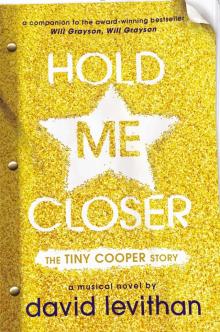 Hold Me Closer: The Tiny Cooper Story
Hold Me Closer: The Tiny Cooper Story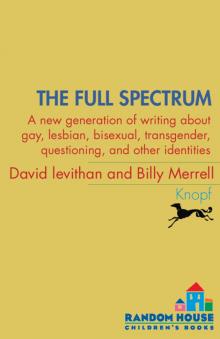 The Full Spectrum
The Full Spectrum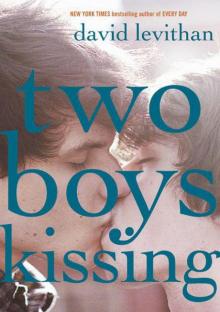 Two Boys Kissing
Two Boys Kissing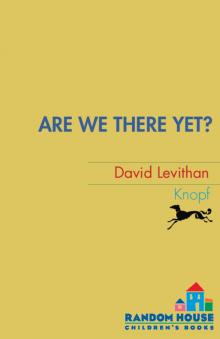 Are We There Yet?
Are We There Yet?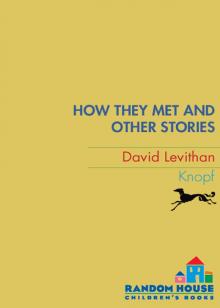 How They Met and Other Stories
How They Met and Other Stories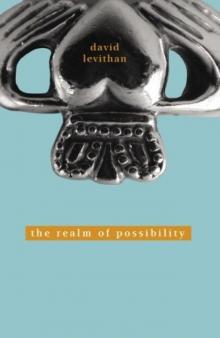 The Realm of Possibility
The Realm of Possibility Love Is the Higher Law
Love Is the Higher Law 19 Love Songs
19 Love Songs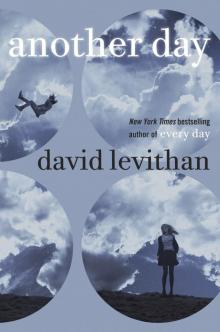 Another Day
Another Day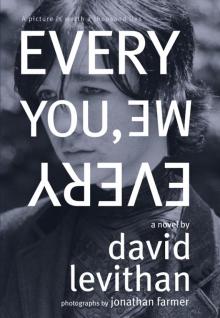 Every You, Every Me
Every You, Every Me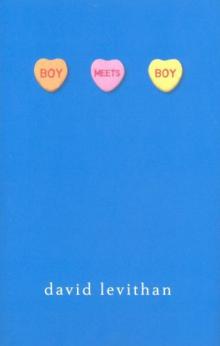 Boy Meets Boy
Boy Meets Boy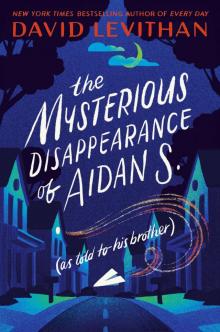 The Mysterious Disappearance of Aidan S. (as told to his brother)
The Mysterious Disappearance of Aidan S. (as told to his brother)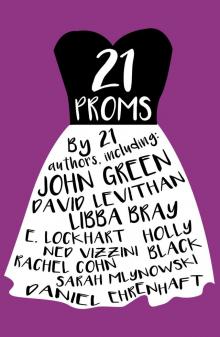 21 Proms
21 Proms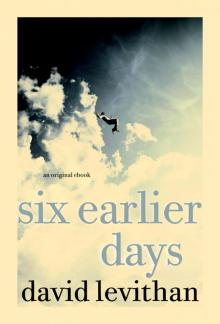 Six Earlier Days
Six Earlier Days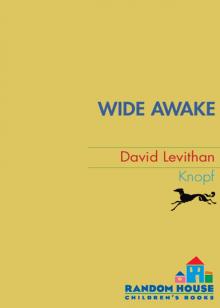 Wide Awake
Wide Awake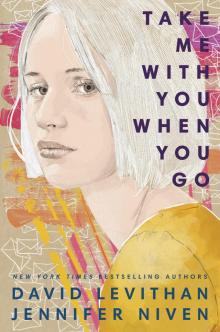 Take Me With You When You Go
Take Me With You When You Go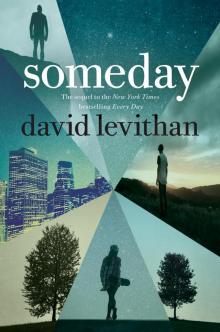 Someday
Someday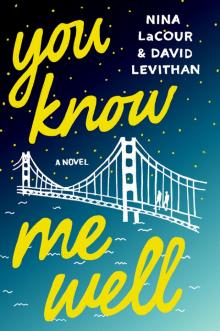 You Know Me Well
You Know Me Well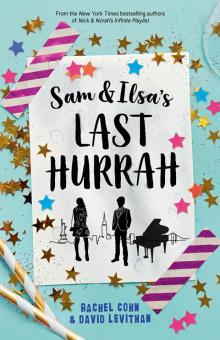 Sam and Ilsa's Last Hurrah
Sam and Ilsa's Last Hurrah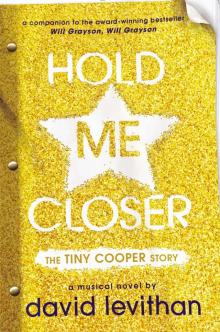 Hold Me Closer
Hold Me Closer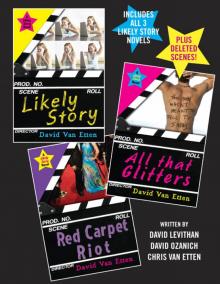 Likely Story!
Likely Story!